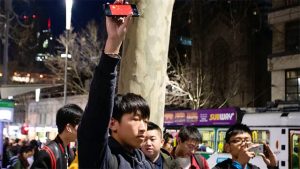Home » Commentary » Opinion » China is destroying our universities
· Spectator
 The Solomon Islands recently decided to ditch its diplomatic recognition of Taiwan in favour of China, irritating the United States and ruffling feathers in Canberra. Meanwhile, at Australian universities, academics are increasingly cautious about saying anything that might offend their increasing numbers of Chinese students. What do these two things have to do with each other?
The Solomon Islands recently decided to ditch its diplomatic recognition of Taiwan in favour of China, irritating the United States and ruffling feathers in Canberra. Meanwhile, at Australian universities, academics are increasingly cautious about saying anything that might offend their increasing numbers of Chinese students. What do these two things have to do with each other?
Quite a bit, as it turns out. The Solomon Islands government was offered $500 million by China to replace aid previously received from Taiwan. And if $500 million can buy the allegiance of a small Pacific nation, imagine what similar amounts could do at a university.
Our imaginations needn’t roam far. Australian universities already receive hundreds of millions of dollars in fees from Chinese students — as well as further funding from Confucius Institutes and other partnerships with the Chinese Communist Party. The University of Sydney alone received $500 million in fees from Chinese students last year.
Hypnotised by these rivers of cash, universities have become oblivious to the dragon’s coils slowly strangling academic freedom in the shadows of new business schools, research centres, and museums paid for by Chinese money.
Universities typically hold themselves out as bastions of academic freedom. But there is a difference between the freedom to publish uncensored ideas in academic journals and the freedom to speak candidly about political issues in the classroom. Academics may have the former, but increasingly they do not enjoy the latter.
One reason for this is that the large numbers of Chinese students at Australian universities are starting to turn their financial clout into political power.
Australian academics have been forced to apologise — or worse — for remarks made in the classroom about Sino-sensitive topics like Hong Kong and Taiwan, Tiananmen Square, Tibet, and border disputes with India. In some cases, these apologies are extracted at the behest of the Chinese consulate.
While more egregious incidents are now reported in the media, the myriad acts of academic self-censorship in classrooms are not. You might dismiss those as trivial. After all, does it really matter if a few academics don’t show that slide about Taiwanese independence?
Well, yes it does. When this kind of self-censorship is practised en masse, it is anything but trivial. It turns pedagogy into propaganda, while real education dies the demise of a thousand cuts.
Chinese ‘soft’ influence has been gnawing away at the integrity of our universities for some time. We must be vigilant lest they sacrifice what’s left of it, for fear of offending their plutocratic benefactors.
Lukas Opacic is a Senior Policy Analyst at the Centre for Independent Studies.
China is destroying our universities